- Home
- Newt Gingrich
Days of Infamy Page 4
Days of Infamy Read online
Page 4
His mother-in-law was already in the backseat. He went around the ′37 Plymouth and slid in on the passenger side even as the engine roared to life and Margaret slammed it into gear.
Tires squealing, she went down the steep driveway, nearly hitting the Johnstons’ Studebaker, which was careering down the street.
“Damn Japs, damn all you Japs!”
It was Ed Simpson, now down on the street, vaguely waving his shotgun toward them.
Margaret, in yet another uncharacteristic gesture, gave Ed the finger, hit the gas, and they were off.
“Where to?” she asked, anger in her voice.
He didn’t know how to respond. Was the bombardment the prelude to a night landing? War games had theorized that if the Japs did attack and attempt a landing, a diversionary force might come into Kaneohe Bay, which could serve as a sheltered anchorage and secure the windward side of the island. In a protracted fight for the island, the airbases at Kaneohe and Bellows could be used by their bombers and fighters.
This could very well be the softening-up blow for that invasion. Get away from here, then. But where?
“Your cousin Janice,” he finally said. Margaret nodded in agreement, taking the next corner fast and hard, weaving around a car backing out of a driveway with headlights off, dodging around people standing in the street. Ahead he saw traffic, cars, the taillights of dozens of cars, their drivers and families all filled with the same thought. Head up Pali Highway and get the hell away from here.
And now he heard it again, but this wasn’t a single salvo, it was a continual roar—dozens of shells screeching in, searching out Bellows, which was illuminated by star shells. Several of the fourteen-inch shells were short, one of them impacting into a storefront, a hair salon that Margaret frequented, just a block ahead. The explosion flipped a car high into the air, end over end, buildings to either side collapsing, and a geyser of water erupting up from a broken water main.
Margaret, now cursing loudly against the “damn Japs,” wove around the wreckage like an expert, her mother sobbing at the sight of the broken bodies that had been torn apart by the blast.
Margaret ran the red light at the intersection, nearly getting hit by an old Model A as she skidded on to State Highway 61, where traffic was growing heavier by the second as more and more, in panic, started to flee, ignoring the orders of martial law. A lone cop, flanked by a portly national guardsman, holding an ′03, stood impotent at an intersection, just watching the traffic race by.
And then everything slammed to a crawl, the twisting two-lane road ahead bumper to bumper.
More flashes of light, the air continually rent by the howl of incoming shells, impacting around Fort Bellows and the coastal gun positions up on the mountain slope. Several of the fort’s guns were firing back, and cynically he knew that given the antiquity of the weapons and the ill-trained crews manning them, their reply fire was most likely splashing down miles wide of any target.
Crawling along at not much more than ten miles an hour, they started to gain up the side of the mountain, and he could see the ocean off to their left. Flashes continually rippled up and down along the horizon. Two heavy ships, undoubtedly battleships, were firing. Smaller, more rapid firing from closer in—those were destroyers—but then every couple of minutes, with almost stately precision, two giant eruptions of light, each turret lighting off a few seconds after the next, the gun blasts so brilliant, even from five or more miles out, as to cast shadows on the mountains, followed fifteen seconds or so later by geysering impacts of fourteen-inch shells, the concussion, even at this distance, numbing.
“The hell with this,” Margaret snapped, and downshifting the car she swung out over the double yellow line, and hit the gas.
Her mother squealed in terror; he said nothing. When she hit one of these moods, which was exceedingly rare, he knew better than to protest—and besides, dozens of others, in front and behind her, were doing the same. Hardly any traffic was coming over the pass heading east, and if it was, it was being run off the road by the thousands now trying to flee into the center of the island.
They slowed for a moment, edging around the shoulder to get past where a head-on collision had occurred, most likely just moments before, one of the cars burning.
Strange how in little more than eighteen hours he had already become inured to the anguish created by war. Someone was inside the burning car, thankfully not moving. A woman clutching a child was beside the funeral pyre, screaming, being restrained by two teenage boys.
They reached the top of the pass, slowing for a moment due to the bumper-to-bumper traffic… and ironically the sea behind them was now dark. The bombardment had stopped.
A number of cars were pulled over by the side of the highway, people out, staring back at the place from where they had just fled.
At the top of the pass, working under the glare of several sets of truck headlights, some national guardsmen were setting up a couple of antiquated seventy-five-millimeter guns, relics of the last war. He shook his head. At dawn, if an invasion was on, this would be one of the first places they’d shell, or they’d send in a few bombers. They should be deploying on the back slope of the mountain, under concealment, not out in the open as they were now doing. My God, he wondered, are we really such amateurs? He wanted to stop, to shout some advice, but knew his suggestion would be ignored.
Margaret slowed in the traffic and finally came to a stop in the confusion.
“Is it over?” she asked. “Should we go back?”
He shook his head.
“No. Janice’s place will be safer.”
She shifted back into gear, went up over the shoulder on the east-bound side to get around yet another accident, this one fortunately not fatal and burning, and started down out of the pass.
She said nothing. He looked over at her, her so-attractive black hair, dark eyes and complexion, more oriental than occidental. And he felt fear. If this indeed is the first move of an invasion, what will happen to her?
He had been at Shanghai, had talked with his friend Cecil about Nanking. A beautiful woman like Margaret? He knew what would happen if this island paradise became a battlefield.
Or on the other side, might the rage be so intense tomorrow, invasion or not, that someone might decide to start stringing up Japanese civilians? It still happened with Negroes in the South; why not Japanese on Oahu after this day, or when the invasion started, if it started?
After coasting for several miles down the Pali Highway, traffic having thinned out somewhat, they turned off into a small development on the northern edge of Honolulu. Janice lived alone; her husband, God save him, was an Army major with MacArthur in the Philippines.
As they turned into her driveway he could see a flutter of curtains. A moment later the door cracked open and she came running out, falling into the arms of Margaret’s mother, her aunt. Both spoke hurriedly in Japanese.
Janice had on her Red Cross uniform.
Margaret got out of the car and the two embraced and for a moment she didn’t notice that James had slid over and was now in the driver’s seat, the car’s engine still running.
She looked back.
“James, what are you doing?”
“I have to go back to the base. If it’s an invasion that’s where I have to be.”
“Damn it, James,” she sighed, anger in her eyes, as if arguing with a recalcitrant child, “this is ridiculous. You’re wounded, you’ve done enough.”
“I have to do my duty,” was all he could say in reply, wondering if the words sounded pompous, but knowing no other way of expressing it.
She leaned over, drawing closer to him, so close that he could smell her perfume, and it lowered his guard.
“What about us?” she whispered. “I might be OK, but what about Mom and Janice? You heard what Ed Simpson was shouting. We need you here.”
He felt his throat tighten. She was right, of course. Invasion or not, he should be thinking of his family now. They nee
ded his protection, be it from the Japanese or some angry lynch mob that might go wild during the night.
And at that instant there were more flashes of light. It was impossible to see from which direction they were coming, or where they were hitting, but a deep rumbling echoed around them as the first shells impacted into Honolulu, as the attacking fleet rounded Diamond Head.
He thought of his comrades, Collingwood, the crew from the decrypt center. What the hell could they do now? Their building had been destroyed in the third strike. What can we do?
But he knew he had to go back, even if just to be with them. Annapolis, twenty years of active duty, were ingrained too deeply into his soul to turn his back on that duty now. He had to be with them, even if the gesture was useless, even if it meant leaving all he had left in this world.
He drew the .38 out from his belt, handed it to Margaret and clumsily fished out the box of shells and gave them to her as well.
“I’m leaving this here with you,” he said, hesitating, “just in case.”
“In case of what?” He didn’t reply at first.
“I wish to hell you had let me train you with this,” he said.
She held the gun nervously and Janice came over, took the pistol, gripping it properly.
“I’ll give her a quick run-through,” Janice said. “I used to go shooting with Tom all the time. This is a double action, isn’t it?”
“First cylinder’s empty. Load it up,” James said.
“Any news?” she asked, and he briefly told her about the bombardment on the east side of the island.
“I was getting set to go down to the fire station, where they’re setting up a blood bank center,” she said. “I’ll get Nana and Margaret settled in first though, and show her how to use the gun.”
“Thanks, Janice.”
He hesitated.
“Maybe you should stay here as well,” James finally said, “just in case things,” again a pause, “turn ugly.”
“It’s only a couple of blocks to the fire station,” she replied casually. “Besides this neighborhood is mostly folks like…”
Her voice trailed off, and her gaze was lowered for a moment.
Like us, he thought, Japanese or half Japanese.
“Promise me this, though,” he replied. “If this is the start of an invasion, I want you to get the hell out. Get Margaret and Nan, get up into the mountains and wait it out.”
He paused.
“Remember what I told you about Nanking. You got one pistol between the three of you, I expect you to know how to use it.”
Damn, this was starting to feel like a bad movie, he thought. What am I supposed to do next, tell her to save the last three bullets for themselves?
“Got ya,” Janice said airily.
She stepped back from the car window, casually flipping the gun open and taking an extra shell out of the box. She slipped it into the cylinder, snapping it shut and testing the feel of the gun. Her husband, career army, had obviously taught her well. James tried to reassure himself that they’d be safe.
Margaret came back alongside him, reached in, and touched his face.
“I’m sorry,” he whispered. “You know I love you.”
She hesitated, and he could sense that she was tempted to try a coup, to simply pull the car door open and drag him out. And as he gazed back at her, only inches away, he silently appealed for her not to do it. He was weak, exhausted, in pain, and just might succumb, and then forever after hold himself in contempt.
The hesitation lingered, and then she leaned in closer, putting a hand behind his neck, drawing him in, kissing him passionately.
“I understand,” she whispered, pulling back, her voice near to breaking.
He started to reach up to grasp the steering wheel and inwardly cursed. He no longer had his claw on. Fumbling, he braced the steering wheel with his legs, using his right hand to shift into reverse.
She stepped back from the car, tears streaming down her face.
“But if you get yourself killed, I’ll never forgive you,” she said.
It was an old line, she had said it a hundred times or more when early in the mornings, in what seemed like an eternity ago, he’d get up before dawn to take his Aeronca Chief out for a dawn flight, before the winds kicked up. But now it was real, it was deadly and real as more flashes snapped across the sky, the echo of incoming shells rattling the heavens, bursting with thunderclaps down along Waikiki Beach.
He backed out into the road, awkwardly turning the steering wheel and shifting into first, not looking back.
Damn it hurt, his left arm throbbing, as he used it to brace the wheel as he shifted into second.
Far down the highway, beyond Honolulu, he could see Pearl Harbor, where he was now heading. Though the bombarding fleet had not yet hit it, there was no need for gunnery fire directions tonight, for the fires ignited by the three air strikes still burned brightly, consuming what was left of eight battleships, oil tank farms, hangars, workshops, and the bodies of more than two thousand men.
225 miles southwest of Oahu
December 7, 1941
23:50 hrs local time
“GOD DAMN IT!”
Admiral Halsey angrily rose from his chair, gaze fixed on the loudspeaker, as if it were an offending messenger and somehow he could take his rage out on it.
He turned to his signals officer.
“Broadcast that through the entire ship.”
“Sir?”
“Are you deaf? You heard me. I want that broadcast through the entire ship now.”
“Sir.” It was Captain George Murray, who was in direct command of Enterprise. “The crew is exhausted. They need to get some sleep.”
He hesitated for only the briefest instant, weighing the option.
“I want them to hear this. I want them to hear what they are fighting. Switch it on!”
He stalked out of the CIC and up to the bridge, the blackout switch automatically turning off the light in the corridor as he pulled the door to the bridge open, the glassed-in bridge illuminated only by red lighting.
“Admiral on the bridge.”
No one turned, though all stiffened even as they stayed focused on their duty.
He looked over at the senior officer on the bridge, a young lieutenant, only a few years out of Annapolis.
“No change, sir,” he reported stiffly, “heading 355, at ten knots. Course change to heading 040 degrees to commence in”—he paused and looked at the chronometer, illuminated by a dull red light—“in ten minutes, sir.”
“Carry on.”
He walked out onto the open bridge, again the ritual of announcing his presence, no one daring to look back at him, observers posted at each corner, scanning with night binoculars, watching both their escorting destroyers, one of them silhouetted by the moon, which was now coasting higher in the southern sky.
Damn, a good night for a hunting sub.
It made his stomach knot up. Take but one torpedo now, on this the first day of the war. Take me out of this fight before we can even start. The thought was enough to make him sick.
He knew the crews of his escorts were on full alert, double watch posted, but they were moonlit on a sea that was flattening out. One of those bastards could be out there right now, setting up for a shot.
The loudspeaker out on the open bridge crackled.
“All hands, all hands.” It was Captain Murray. “By order of the admiral. This is a broadcast from a civilian station in Honolulu.”
The loudspeaker crackled again, signal lost for a moment, wavering, and then came in clear.
“Three more explosions. I can see them. The Royal Hawaiian Hotel is burning.” The signal wavered for a moment. “A Jap ship is lying in close to the shore at Waikiki. I can see the flashes of its guns.” A long pause. “I’ve just been handed this. Do not leave your homes. The island is under martial law. Only military personnel or those authorized civilians reporting to bases, hospitals, or emergency centers
will be allowed onto roads. I repeat… stay in your homes. Turn off all lights, turn off gas lines. Do not use your phones….”
No one on the bridge spoke, Halsey stood silent, looking out to sea, to the northeast, as if somehow he could actually see the flashes of battle.
“Oh my God, this is close, I think right over my head.” A rumbling sound overwhelmed the announcer’s voice, followed several seconds later by an explosion that overloaded the broadcast signal.
“That was damn close,” the announcer gasped, barely audible. “They’re bombarding downtown Honolulu now. I’m not sure how much longer we’ll be on the air.”
A moment later he could feel Enterprise beginning to heel over slightly as it turned forty-five degrees to starboard, zigzagging. He looked back into the bridge. It was exactly two minutes past midnight.
A minute later they trimmed out onto their new heading. His helmsman was good—not the slightest deviation, no need to correct by even a degree or two. In the moonlight he could see the one escort on the exact same heading.
“I can see explosions. I think they’re hitting Hickam,” the radio crackled, signal wavering for a moment. “I’ve just received this. There is a desperate need for all negative type blood, especially AB negative, and positive as well. Please report to your nearest fire station where blood banks are being established. If stopped by military patrols, have them escort you to the nearest fire station…. There’s more explosions, they’re pouring it in now. My God it’s horrible, just horrible.”
Damn, he wished now someone would get the damn station to shut up. The Japs would, of course, be listening as well, helping them to adjust fire.
He went back in to the bridge, picked up a phone linking him back to the CIC.
“Turn that off, put me on.”
“This is Halsey,” he said, voice cold, even-pitched, his voice echoing through the ship.
“You just heard it. The damn Japs are bombarding Honolulu. Our civilians are now targets. Some of you men have families there, all of us have friends there. Now you know what we are fighting. At dawn we launch and we’ll send those bastards to hell.

 1945
1945 Collusion
Collusion Trump's America
Trump's America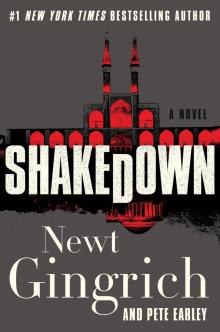 Shakedown
Shakedown A Nation Like No Other
A Nation Like No Other To Try Men's Souls - George Washington 1
To Try Men's Souls - George Washington 1 Pearl Harbor: A Novel of December 8th
Pearl Harbor: A Novel of December 8th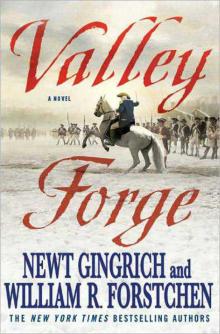 Valley Forge: George Washington and the Crucible of Victory
Valley Forge: George Washington and the Crucible of Victory To Save America
To Save America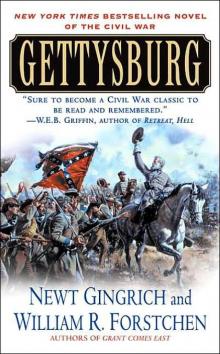 Grant Comes East cw-2
Grant Comes East cw-2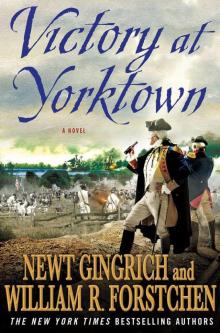 Victory at Yorktown: A Novel
Victory at Yorktown: A Novel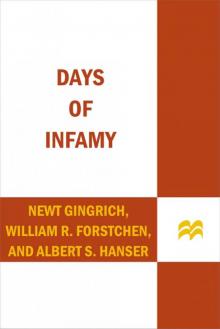 Days of Infamy
Days of Infamy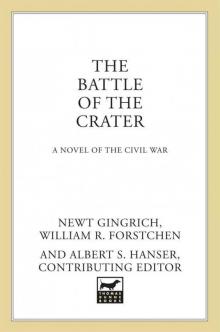 The Battle of the Crater: A Novel (George Washington Series)
The Battle of the Crater: A Novel (George Washington Series)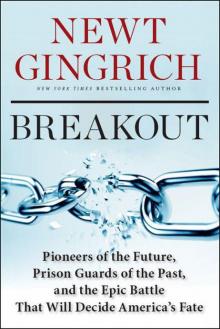 Breakout: Pioneers of the Future, Prison Guards of the Past, and the Epic Battle That Will Decide America's Fate
Breakout: Pioneers of the Future, Prison Guards of the Past, and the Epic Battle That Will Decide America's Fate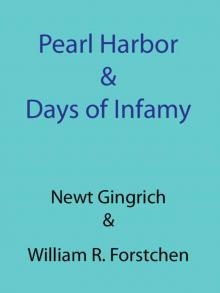 Pearl Harbour and Days of Infamy
Pearl Harbour and Days of Infamy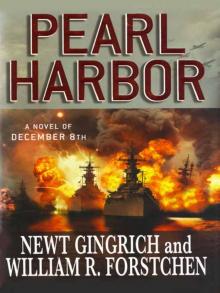 Pearl Harbour - A novel of December 8th
Pearl Harbour - A novel of December 8th Understanding Trump
Understanding Trump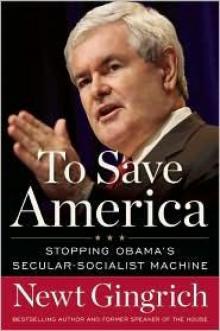 To Save America: Abolishing Obama's Socialist State and Restoring Our Unique American Way
To Save America: Abolishing Obama's Socialist State and Restoring Our Unique American Way